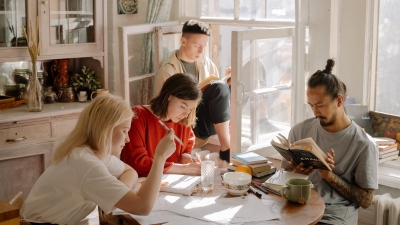Do you still remember those good old days? How you cycled to the Uithof together with all the other students, only to take a seat in the lecture hall with that watery coffee from the machine? How you tried to secure a place in the University Library at 7.30 AM during your midterms? And how you put on a fireplace video to keep your seat occupied, while you went out for lunch with your friends?
A lot has changed in the past year, but perhaps the most significant change was the closure of the universities. From one day to another, your dorm room became the place where you not just sleep and relax, but also follow the lectures, work out, and socialise. That is pretty intense. How do students feel about this educational setup? Will it affect the value of their diplomas? And what does the future of education look like?
“All my lectures are pre-recorded. I used to be able to ask questions during seminars and lectures, but that is no longer possible. Online education is actually a bit boring, so it is hard for me to stay motivated.”
- Student Niels
Students mostly miss each other
On March 17, 2021, the action group #Ikwilnaarschool organised a protest in Utrecht. Dozens of students gathered on Janskerhof to listen to protest lectures by fellow students and teachers. Organiser Joshua Roos tells in an article by Trajectum HU that the protest is definitely needed, “because online education leads to motivational problems, loneliness, and depression.” This also becomes apparent from a study by ResearchNed, in which over 11500 students filled in a questionnaire. Although the study progress did not significantly change during the pandemic, one in twenty students experiences problems with both their mental health and online education itself.
“If the only person you see all day is your own reflection on your laptop screen, it makes sense that students feel lonely and have mental problems.”
- Dahran Çoban, chairwoman of student organization ISO
Research by dr. Arthur Bakker (UU) and colleagues, in which they questioned almost 1500 students from Utrecht, confirms this. Students are having a hard time staying concentrated (28%) or motivated (23%). They mainly miss their fellow students and the interaction with the teachers. Student Marleen recognises this: “I have most of my classes online and it really feels as if I have reached my limit. Studying normally requires energy, but it is also supposed to give me energy. Now it no longer does. Moreover, I do not feel connected with my classmates. Hopefully, it will soon be possible to follow our classes on location.”

Corona diploma
Both studies also showed that students are concerned about the quality of their education. One in three HBO students and a quarter of the WO students, to be precise. They are particularly worried if they will have the right qualifications for a job in the future. Student Sofia agrees: “I mostly worry if my online internship will provide me with sufficient experience and expertise to get a job.” Associate professor of the department Education Dr Lisette Hornstra (UU) understands the concerns, but strongly emphasises that students have nothing to worry about: “Online education might be less inspiring, but it has the same overall quality as physical education. As such, the requirements students have to meet have not changed.” Furthermore, this group of students will become “pioneers on this type of education and online communication.” Their experiences and proficiency will therefore be of exceptional use in the future, Lisette states.
“I feel like I am learning way less than when I am attending the actual lecture. That is hard, because how can I make a balanced decision about my future if I do not have any experience?”
- Student
Dreams for the future
Starting the 26th of April 2021, the universities slowly opened up again. By using self-tests and strictly following the corona measures, it will be possible for students to return to campus for one day a week. This leads to the question: how does the future of our educational system look like? Dr Anouschka van Leeuwen (UU), specialised in educational technology, already has an answer. Her personal preference is blended learning, a hybrid form which combines classes on campus with online classes. “The idea for blended learning already existed but really got boosted by the pandemic. Suddenly, everyone was forced to use online tools, whether they liked it or not. This has taken away previous doubts and concerns, and both students and teachers became aware of the many advantages of online education,” Anouschka explains.
“Online education is much more relaxed; I now have a clear overview of what I need to do. However, I do find it difficult to work together with other students like this."
- Student
Most of the teachers I talked to agreed with Anouschka. Pre-recorded classes, knowledge clips, and individual coaching sessions could indeed be provided online. As such, there will be more time for those classes which require more interaction between student and teacher, for example workgroups and presentations by fellow students. In this way, students will still stay in touch with their fellow students, but also benefit from a more efficient educational set-up.
For now, these ideas are still dreams for the future, as only 35% of the classes of the UU are on campus. In the meantime, I have collected some tips for students to stay motivated and focused:
- Arrange a proper and quiet working spot. Only study there, not on your bed or on the couch. Ask your roommates to not disturb while studying and put your phone away so you will not get distracted. The app Forest might help you with that: for every half hour not checking your phone, you will grow a tree. If you, by accident, do happen to look on Instagram, your tree will unfortunately die.
- Being online and present for the whole day is extremely exhausting, so take breaks. Dance, stretch, make a cup of tea, or go for a walk outside. This will not only help you to relax but is also beneficial for your ability to concentrate and will help you to process what you have just learned.
- Keep in touch with your fellow students. You might want to study together with a group of students, for example. Or stay after your online class, just to talk or play a game (Skribbl is highly recommended!).
--
How is it really going with our students? In this series of five articles, I talk with students and scientists in search of answers, scientific explanations, and useful tips. What impact does the pandemic have on the wellbeing and development of students? How does a lack of touch and intimacy affect you? How do the students like the online classes? And what does the "new normal" look like?





